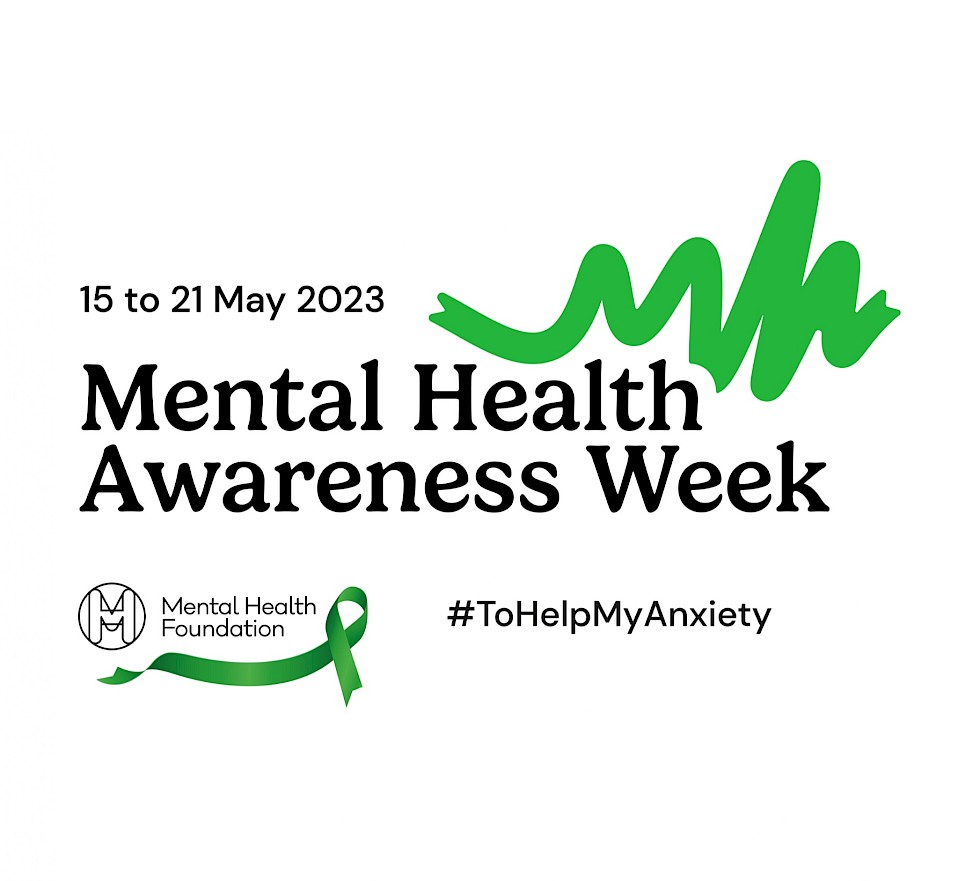Anxiety is the theme of Mental Health Awareness Week 2023.
Anxiety is a normal emotion in us all, but sometimes it can get out of control and become a Mental Health problem.
Lots of things can lead to feelings of Anxiety, including exam pressures, relationships, starting a new job (or losing one) or other big life events. We can also get anxious when it comes to things to do with money and not being able to meet our basic needs, like heating our home or buying food. But anxiety can be made easier to manage.
For referees, the most specific form of Anxiety related to the role is Performance Anxiety. Sometimes called “choking,” Performance Anxiety involves a decrease or impairment in performance on the field of play due to perceived stress. Such stress is often caused by an official’s high expectations and the added pressure of being observed by onlookers.
Performance Anxiety symptoms are often present in referees. While some officials become “pumped up” during the match, if you interpret the rush of adrenaline as Anxiety and negative thoughts take over, this can interfere with your ability to perform effectively.
Before you learn how to manage the symptoms of Anxiety during fixtures, it is critical to understand the relationship between Anxiety and your refereeing performance.
How Anxiety Can Affect Your Refereeing Performances
Anxiety before or during your games can interfere with your performance as a match official. The movement required by the phases of play in matches becomes increasingly difficult when your body is tense.
A certain level of physical arousal is helpful and prepares us for the first whistle. However, when the physical symptoms of Anxiety are too high, they can interfere with your ability to referee the game.
A certain amount of worry about how you perform can be helpful on matchday too. At the same time, negative thought patterns and expectations of failure can create a self-fulfilling prophecy.
Anxiety may be affecting your performance if there is a large difference between how you fare when training and how you preform in the fixtures you’re appointed to.
Signs of Refereeing Performance Anxiety
While everyone’s individual experience differs, some common signs of Anxiety in refereeing performances include:
- Apprehensiveness
- “Butterflies” in the stomach
- Chills
- Clammy hands
- Fatigue
- Increased breathing rate
- Muscle tension
- Rapid heart rate
- Sense of panic or impending doom
- Sweating
- Trembling
- Weakness
In some instances, people can experience panic attacks due to Performance Anxiety. During a panic attack, a person may experience intense, overwhelming fear, nausea, chest pain, pounding heart, difficulty breathing, and dizziness.
Causes of Refereeing Performance Anxiety
Sport psychology is a division of psychology aimed at better preparing a referee’s mind for matchday. I work with officials to help them understand what causes this Anxiety and to overcome Anxiety about performance during games.
Several factors can play a role in causing Anxiety in refereeing performances. Some of these causes include:
- Social anxiety: People with social Anxiety disorder fear social and performance situations. The most common fear is public speaking. However, other types of performances, such as musical and officiating, may also lead to Anxiety. This type of Anxiety would be classed as social Anxiety disorder in its most extreme form.
- Lack of experience: Some referees are more prone to feeling the effects of Anxiety on performance. As a grassroots official, you are more likely than colleagues operating in the professional game to experience Anxiety that interferes with your ability to perform on the field of play. This is due to the fact that grassroots referees are still building experience of officiating key fixtures and managing feelings of being “pumped up.”
- Solo refereeing: If you are an official who is refereeing alone, you are also more likely to experience Anxiety than your colleagues who work in a team of officials. Being part of a team helps manage some of the pressure you feel when refereeing alone.
- Performance location: Studies have shown that if you officiate at hostile venue or location, Anxiety levels tend to be higher.
Having greater support and being more familiar or comfortable with the location helps to reduce Anxiety.
How to Thrive on The Field of Play Under Pressure
How are elite referees consistently able to rise to the challenge when faced with the tough fixtures? Research shows that self-confidence plays a role in how you respond to symptoms of Anxiety when officiating.
If you are confident in your ability, you are more likely to have a positive reaction to being “pumped up” and will thrive on the challenge of matchday. Elite referees are often so focused on their behaviour that they interpret arousal as excitement rather than Anxiety.
In general, self-confidence tends to be highest when you believe in your ability and feel that you have adequately prepared for a game.
Worry and confidence are at opposite ends of the spectrum; when confidence is strong, it tends to crowd worry out of the mind.
Coping With Anxiety in Your Refereeing Performances
There are many strategies you can employ to reduce performance Anxiety symptoms, such as the following:
- Prepare: Ensure you have trained enough to be confident during the match you’ve been appointed to. Spend extra time working on preparing in the days or weeks before a fixture.
- Get social support: Ask friends, family or colleagues to support you for “challenging” games. Knowing that your support system is there to cheer you on can help you feel more confident and less Anxious. You can also generate that “team spirit” even for matches where you’re officiating individually.
- Reappraise arousal: Learn how to interpret arousal during the game as positive or acceptable rather than negative. Reappraising Anxiety as excitement can help combat performance anxiety.
- Reframe negative thoughts: Negative thoughts can make Anxiety about refereeing performances worse. You can combat this by using cognitive reframing to change your thoughts about situations. Identifying negative thoughts allows you to actively challenge them and replace them with more positive, realistic ways of thinking.
- Use positive self-talk: How you talk to yourself about your performance can also influence the amount of anxiety you experience. Research has shown that positive self-talk can contribute to greater confidence and self-efficacy, better performances on the field of play, and less Anxiety.
You can also use several strategies to help manage Anxiety and induce relaxation related to officiating performances, including visualisation and progressive muscle relaxation.
How Can I Get Professional Help For Myself, A Family Member or Colleague?
If you find that your Anxiety symptoms are severe and do not improve with self-help strategies, plan a visit to your doctor or contact a therapist to discuss your concerns. Severe Anxiety in your refereeing performance can be a sign of social Anxiety disorder. In such cases, professional treatment can provide relief and help address Anxiety before it interferes with your life and ability to function.
There are many different support networks out there which you can access as a referee or in relation to your wider mental health. See the list below to find the support network most relevant to the different needs you may have.
Within Football:
- Contact your County FA to see if they are running any initiatives around mental health.
- The Referees’ Association (RA) is able to offer support and guidance: the-ra.org
- Ref Support UK provides the option to send them a message through their website (https://refsupport.co.uk/contact-us/) or for more urgent and serious matters they have a hotline: 0300 311 1966
General Information:
- Mind InfoLine: 0300 123 3393. The Mind Infoline can help find specialist services in your area.
- Mind website: www.mind.org.uk
- Every Mind Matters: visit www.everymindmatters.co.uk to get your free, online ‘Mind Plan’, designed to give you simple, personalised tips for a healthier mind.
Helplines & Listening Services:
- Samaritans: 24 hours a day, 365 days a year. Call 116 123 (free from any phone).
- SANEline: 0300 304 7000 (4.30pm–10.30pm every day).
- HeadsUp: For immediate support text HeadsUp to 85258 to chat by text to a trained and supervised volunteer. Free, confidential and available 24/7.
- CALM (Campaign Against Living Miserably): 0800 58 58 58 (5.00pm to midnight, 365 days a year). For more options, visit the Helplines Partnership website for a directory of UK helplines: www.helplines.org/helplines.
For more information on The FA’s mental health guidelines on mental health you can find the document here.
At The Third Team I work individually and in collaboration with different professionals where I have developed workshops and 1-2-1 sessions associated with Resilience and Mental Toughness Development to help referees. The workshops and 1-2-1 sessions are interactive, where referees are encouraged to open up and share their experiences to help themselves and each other.
Feel free to contact me if you’d like to know more about my workshops or 1-2-1 sessions and how I could help you or your officials.
Best Wishes,

Nathan Sherratt
Referee Educator & Managing Director of The Third Team

Nathan Sherratt
Nathan Sherratt, Referee Educator, Resilience Trainer and Managing Director of The Third Team. A Mental Toughness Practitioner based in County Durham, North East England.

